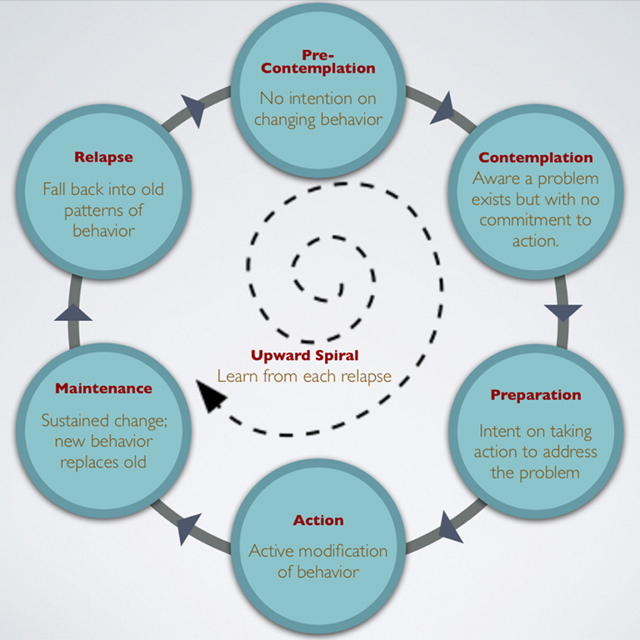This handout makes a great addition to your digital Social Work Tool Box (also known as the Social Work Tool Kit). Along with this hand-out, a non-scholarly narrative follows to explain this important model 🙂
UPDATE: THIS WAS TRANSLATED TO SPANISH AND YOU CAN READ ABOUT IT HERE: El Ciclo De Cambio
Downloadables
EDIT: YOU CAN DOWNLOAD IN BLACK AND WHITE OR COLOR HERE: Social Work Tech Tools
(this was moved to my Tools page because I’m updating these regularly and all I had on here were dead links).
Change Theory
The above-cited model shows a variety of stages that one can expect to go through when modifying behavior. Whether it is you or your client, Prochaska & DiClemente’s model (1983) indicates that a person at any given time during this process is in a certain stage.
Although the word “Relapse” may suggest that this model applies to drug/alcohol treatment, this model applies to all types of desired change, whether it is as trivial as ceasing to bite your fingernails or as serious as controlling one’s anger.
Stages
As you can see, there are various stages of the model (and the behavior expected of the person experiencing change):
- Precontemplation: A logical starting point for the model, where there is no intention of changing behavior; the person may be unaware that a problem exists
- Contemplation: The person becomes aware that there is a problem, but has made no commitment to change
- Preparation: The person is intent on taking action to correct the problem; usually requires buy-in from the client (i.e. the client is convinced that the change is good) and increased self-efficacy (i.e. the client believes s/he can make change)
- Action: The person is in active modification of behavior
- Maintenance: Sustained change occurs and new behavior(s) replaces old ones. Per this model, this stage is also transitional
- Relapse: The person falls back into old patterns of behavior
- Precontemplation: The person may be unaware that there’s a problem, thus there is no intention to change behavior
The End of Change?
The model does not show an end to the process of change and suggests that a person is ever-progressing in the cycle.
Logically, Relapse, or recurrence of previously undesired behaviors, would follow Maintenance of the newly acquired behaviors. It is possible for someone to stay years at the Maintenance stage or to never have a Relapse. When one Relapse, they may not be aware of it (i.e. Precontemplation) or may go through the Precontemplation phase quickly to being aware of the problem (i.e. Contemplation).
Bonus Tip: It is hoped that in the stages of Preparation, Action, and Maintenance, that a person has developed resiliency, a support system and other coping mechanisms so that they can avoid the Relapse stage or get through it quickly.
In Social Work Practice
As previously stated there are different contexts in which this model can be applied.
In Drug and Alcohol Recovery, this model is popular to help patients understand their pending journey or the journey they have made to the current point.
In psychotherapy (and when clinically appropriate), I have shown the above model to clients I have counseled who have been discouraged about their failure or lack of progress in some of their desired changes.
I show the client where s/he was prior to coming to therapy – sometimes at Precontemplation due to not having a direction at the start, at the Contemplation stage due to realizing that there is a problem, or at the Action stage due to wanting support on the action that they wish to embark upon. I will reflect on their Actions and reflect on the achievements that they have made to graduate to Maintenance. I congratulate them for making it to the Contemplation stage and being self-aware that they Relapsed.
Empowerment comes from helping the client to reflect on what did not work in the Maintenence stage and helping them to correct that when taking Action. Again, I stress, building resiliency (including a support system and healthy coping mechanisms) is a very important task during the Action stage.











Thanks for sharing, Ignacio!
You’ve given me a diving board to leap into a pool of uncertainty which has beset our school environment (rebuilding, personnel turnover and awe-inducing change). I have been contemplating the amplification of individual uncertainly to system scale in order to get my head around change management. Love the model.
Sam